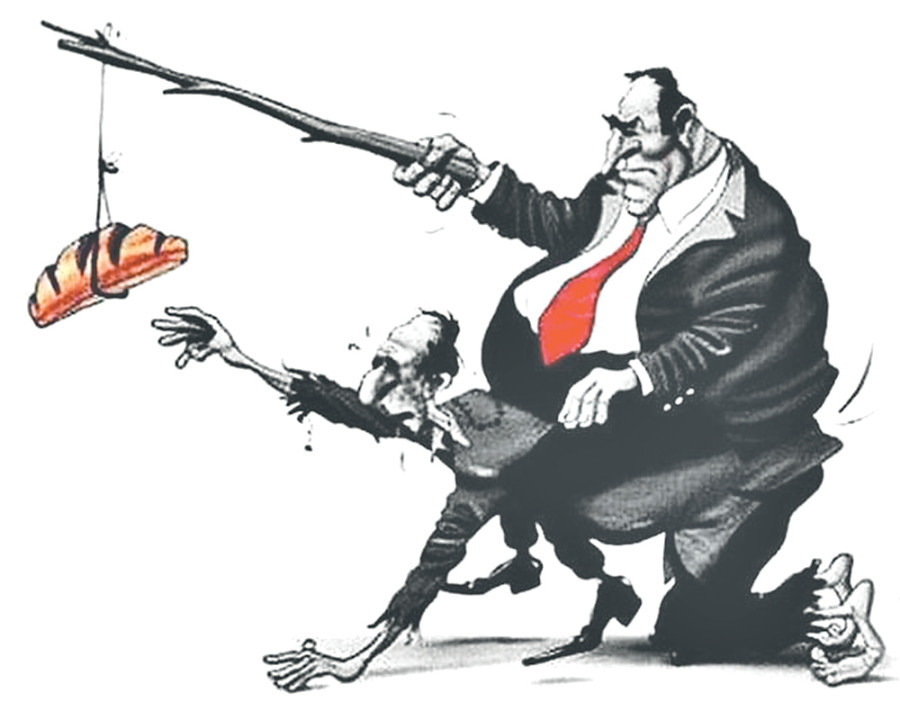Miscellaneous
Towards a kleptocracy?
There are unmistakable signs that we as country are fast becoming a kelptocracy as our ministers, parliamentarians and officials enrich themselves at the expense of the public. In what was
There are unmistakable signs that we as country are fast becoming a kelptocracy as our ministers, parliamentarians and officials enrich themselves at the expense of the public. In what was
a tell-tale year, the citizens have watched big tragedies, such as the earthquake and the transit blockade, come and go, with the ruling class exploiting them as opportunities to line up their own already deep pockets.
How else do you otherwise explain the fact that even after 16 long months, the survivors of the April earthquakes are still languishing in temporary shelters? This isn’t due to lack of resources. How do you explain the fact that six months after the blockade, the price of essential commodities continue to soar? This against backdrop of oil prices, which has outsize effect on commodity prices, falling. How do you explain the fact that despite ample evidence of the abuse of authority by officials, our top leaders in the government and in the parliament maintain an eerie silence?
All these, and many other pressing issues, beg the question: Are we really a democracy?
In a representative democracy, the parliament is the repository of the general will of the people. The parliament exercises sovereign right of the people for the greater good. In theory, parliament is above all government institutions, except when it contravenes the constitution. In John Locke’s model, the executive is subordinate and accountable to the parliament. But is Nepal’s parliament really sovereign?
The oversight mechanism of the parliament is its greatest strength but over time both through ignorance and shenanigans, the parliament’s authority has steadily eroded to a point where other government institutions no longer take it seriously.
Take a look at the umpteenth directive issued by the parliamentary committees. How many of the hundreds of directive these committees issue in a year are actually implemented?
In the post 1990 era, Parliamentary Accounts Committee (PAC) was one the most active committees. It continuously held to account corresponding government departments. PAC was in the news almost every day for its hearing and directives. In subsequent years, Nepal’s parliament has lost that aura of authority and there are fewer debates on issues of public importance.
Today, parliamentary committees issue contradictory statements. There is often a turf war between different committees—contributing to waning reverence of these committees in the eyes the very officials who are subordinate to the legislative branch. So much so that ministers and officials of constitutional bodies routinely snub these committees. There is a running joke that at the end of each committee hearing, MPs demand a field or exposure visit from the corresponding government agency.
The erosion of parliamentary authority has been seen in the actions of the parliament, or lack thereof on several issues: impeachment demands against the chief of the Commission for Investigation of Abuse of Authority (CIAA), and promoters of banks, hospitals and schools, who also double as MPs, drafting laws to regulate themselves without any qualms about the blatant conflicts of interest, to name a few.
Last month, under pressure from the public, led by Dr Govind KC, three parliamentarians registered a motion of public importance to discuss the impeachment of the CIAA chief. Yet, even several weeks after the registration of the motion, parliament has taken no steps to begin discussions. Many suspect that the speaker and other MPs are terrified of the individual in question because they all have skeletons in their closets, hence the deliberate delay on the impeachment discussion.
There are others who fear that the motion to discuss the impeachment was brought in a bad faith. They argue that the three parliamentarians did not follow correct procedure in registering the motion. In fact, they say, the motion would at best discuss impeachment but would take no further action because it is registered as motion of public importance.
The constitution mandates that at least one-fourth majority can table a motion of impeachment. Subsequently the parliament would form an 11-member committee to recommend charges against the individual in question—which then has to be endorsed by a two-third majority.
Instead of exercising this parliamentary oversight, leaders and MPs from all parties are busy defending the very individual and institution they were expected to maintain an oversight over. Many MPs have reportedly visited the individual in private, assuring him that they would not vote for the impeachment if it ever comes to that.
Parliamentary seats are being sold and appointments to key departments are being auctioned to the highest bidder. Bribes have now become prepaid and officials demand signing amount from business that win government contracts.The list goes on.
If these aren’t the unmistakable signs of the subversion of the democratic system into a kleptocratic one, then what is?




 8.12°C Kathmandu
8.12°C Kathmandu









